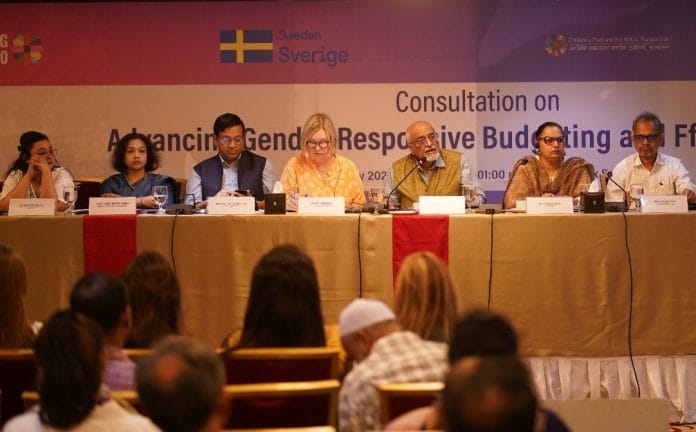As Bangladesh prepares its national budget for the fiscal year 2025–26, policymakers, civil society actors, and development partners have called for strengthening gender-responsive budgeting (GRB) to ensure fiscal policies better address the specific needs of women and girls.
The call was made at a pre-budget dialogue titled “Advancing Gender-Responsive Budgeting and FfD4 Outcome,” jointly organized by the Citizen’s Platform for SDGs, Bangladesh, and UN Women Bangladesh in Dhaka on May 26. The event comes amid preparations for the Fourth International Conference on Financing for Development (FfD4) and the fast-approaching 2030 deadline for achieving the Sustainable Development Goals (SDGs).
Dr. Debapriya Bhattacharya, Convenor of the Citizen’s Platform and Distinguished Fellow at the Centre for Policy Dialogue (CPD), stressed that women in Bangladesh continue to face mounting economic pressures—from rising inflation to declining private investment—which are often inadequately reflected in national statistics.
Gitanjali Singh, Country Representative of UN Women Bangladesh, highlighted the need to institutionalize gender budgeting across all ministries. She identified ending child marriage, promoting inclusive infrastructure, and strengthening social protection as key priorities—particularly as Bangladesh transitions from Least Developed Country (LDC) status.
Presenting an economic overview through a gender lens, CPD’s Towfiqul Islam Khan reported a significant drop in female employment—an estimated 1.8 million jobs lost in the first half of the current fiscal year. He noted stagnating progress on gender empowerment and emphasized the need to move beyond symbolic allocations to rigorous tracking of budget outcomes that tangibly impact women’s lives. He also highlighted unpaid care work, high NEET (Not in Education, Employment, or Training) rates among young women, and vulnerabilities faced by female migrant workers as areas requiring urgent policy attention.
UN Women’s Nubayra Jeheen provided an overview of the country’s gender budgeting landscape, noting that while 44 ministries now produce gender budget reports, many remain misaligned with SDG and climate goals. She underscored the need to improve data quality and monitoring mechanisms to ensure public spending yields real change.
Rekha Saha of Bangladesh Mahila Parishad presented a “Charter of Demands” developed in collaboration with Bonhishikha and UN Women. The charter focuses on enhancing women’s economic empowerment, leadership opportunities, and the inclusion of marginalized communities in budget-making processes.
Government officials also underscored the need for more effective implementation. Tasnim Zeben Bentea Sheikh, Deputy Secretary at the Ministry of Women and Children Affairs, called for evidence-based and needs-driven interventions. Ferdousi Sultana of the Women’s Affairs Reform Commission highlighted the importance of better coordination, skill development, and capacity building at the grassroots level.
Maria Stridsman, Head of Development Cooperation at the Swedish Embassy in Dhaka, stated that national budgets reflect societal values and urged greater inclusivity in budget formulation, especially in challenging traditional norms.
Abul Kalam Azad, Joint Secretary of the Economic Relations Division, described GRB as a vital pillar of broader fiscal reform. He emphasized the importance of digital tools, civil society engagement, and increased investment in women’s economic participation—particularly as Bangladesh shifts from aid dependence to a partnership-based development model.
The dialogue aimed to deepen collective understanding of gender-responsive budgeting and its importance in delivering equitable development outcomes. It also sought to inform both the national budget for FY26 and Bangladesh’s global commitments under the FfD4 process.

